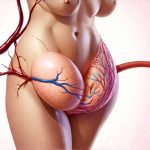Gut changes are remarkably common in women, yet often dismissed as ‘just stress’ or normal fluctuations. This is problematic because gut health is inextricably linked to overall well-being, influencing everything from mood and energy levels to immune function and hormonal balance. For women specifically, the cyclical nature of hormones (menstrual cycles, pregnancy, menopause) introduces additional layers of complexity that can significantly impact digestive processes. Ignoring persistent or concerning gut changes can lead to chronic conditions and diminished quality of life. Recognizing when a change warrants further investigation is crucial, as early diagnosis and intervention often yield the best outcomes. Considering how you approach food with a reactive gut can be beneficial from the start.
The female gastrointestinal system differs in several ways from its male counterpart – physically, hormonally, and even in terms of disease prevalence. Conditions like Irritable Bowel Syndrome (IBS) are more commonly diagnosed in women, and they frequently experience heightened sensitivity to gut symptoms. Furthermore, hormonal shifts can directly affect gut motility, microbiome composition, and visceral pain perception. This means what might be a minor inconvenience for one person could signal a significant issue for another. Understanding this nuance is paramount when evaluating digestive concerns in women and choosing appropriate diagnostic pathways. It’s about moving beyond generalized approaches and acknowledging the unique physiological landscape of the female body. Practicing compassion practices can ease the mental burden that often accompanies chronic gut issues.
Common Symptoms & Initial Assessments
Gut changes manifest in countless ways, making accurate self-diagnosis difficult. Some of the most frequently reported symptoms by women include bloating, abdominal pain (ranging from mild discomfort to severe cramping), changes in bowel habits (diarrhea, constipation, or alternating between both), nausea, excessive gas, heartburn, and fatigue. However, these symptoms can overlap with other conditions—making a thorough assessment vital. It’s also essential to consider seemingly unrelated symptoms that could be linked to gut health, such as skin issues (eczema, acne), mood swings, anxiety, or brain fog.
Initial assessments typically begin with a detailed patient history. A healthcare professional will ask about the onset and duration of symptoms, dietary habits, medication use, stress levels, family history of gastrointestinal disorders, and menstrual cycle regularity. This conversation helps build a preliminary picture and guides subsequent diagnostic choices. Physical examinations, including abdominal palpation to check for tenderness or masses, are also standard. Often, healthcare providers will recommend a period of symptom journaling—tracking food intake, bowel movements, and associated symptoms—to identify potential triggers or patterns. Utilizing gut rest techniques during flare ups can provide needed relief.
The initial phase often involves relatively simple tests to rule out common causes. These might include basic blood work to assess for anemia (often linked to malabsorption), inflammation markers like C-reactive protein (CRP) or Erythrocyte Sedimentation Rate (ESR), and a stool sample to check for infections or parasites. Ruling out infection is always the first step, as it can mimic many gut disorder symptoms. Depending on initial findings, further investigation may be needed.
Stool Testing: Beyond Basic Analysis
While basic stool tests screen for obvious pathogens, more advanced stool analysis offers a much deeper insight into gut health. These comprehensive analyses – often available through private labs or functional medicine practitioners – go beyond identifying bacteria and viruses to assess the overall composition of the gut microbiome. They can measure levels of beneficial bacteria, harmful bacteria, yeasts (like Candida), and even markers of inflammation within the digestive tract.
- Microbiome diversity is a key indicator of a healthy gut. A diverse microbiome is more resilient and better equipped to handle challenges.
- Specific microbial imbalances can be linked to different symptoms or conditions. For example, an overgrowth of certain bacteria might contribute to bloating and gas, while a deficiency in others could compromise immune function.
- Stool tests can also evaluate digestive capacity—assessing how well the gut is breaking down fats, proteins, and carbohydrates. This helps identify potential enzyme deficiencies or malabsorption issues.
It’s important to remember that stool testing isn’t always definitive. The microbiome is incredibly dynamic, influenced by diet, lifestyle, and various other factors. Results should be interpreted within a broader clinical context, alongside the patient’s symptoms and medical history. Furthermore, some tests have varying degrees of scientific validation, so choosing a reputable lab is crucial. Focusing on calming flavor profiles during times of gut distress can be soothing.
Blood Tests: Uncovering Underlying Issues
Beyond basic blood work, specialized blood tests can help uncover underlying causes of gut changes in women. One important test is celiac disease screening, which involves looking for antibodies associated with gluten intolerance. Even without classic symptoms like diarrhea and weight loss, celiac disease can manifest as fatigue, bloating, or anemia. Another crucial area to investigate is food sensitivities/intolerances. While different from allergies, intolerances can cause significant digestive distress.
- IgA and IgG tests are sometimes used to assess food sensitivities, though their reliability is debated within the medical community.
- Testing for Small Intestinal Bacterial Overgrowth (SIBO) often involves a breath test that measures hydrogen and methane levels after consuming specific sugars. SIBO occurs when excessive bacteria accumulate in the small intestine, leading to bloating, gas, and malabsorption.
- Hormone testing can also be valuable, particularly in women experiencing cyclical gut changes. Imbalances in estrogen or progesterone can directly impact gut motility and microbiome composition. Understanding hydration timed meals can support optimal digestion.
It’s important to note that blood tests are just one piece of the puzzle. Results must be interpreted carefully by a healthcare professional who understands their limitations and can correlate them with the patient’s overall clinical picture.
Endoscopic Procedures: Direct Visualization
In cases where symptoms are persistent or other investigations yield inconclusive results, endoscopic procedures may be recommended. These procedures allow for direct visualization of the digestive tract and collection of tissue samples for biopsy. Colonoscopy involves inserting a flexible tube with a camera into the rectum to examine the colon. It’s often used to screen for colorectal cancer but can also help diagnose inflammatory bowel disease (IBD) or identify polyps.
- Upper endoscopy, also known as esophagogastroduodenoscopy (EGD), examines the esophagus, stomach, and duodenum. This is useful for diagnosing conditions like gastritis, ulcers, or celiac disease.
- Biopsies taken during these procedures can provide valuable information about inflammation, tissue damage, and microbial activity within the gut.
Endoscopic procedures are generally safe but carry some risks, such as bleeding or perforation. Patients should discuss these risks with their healthcare provider before undergoing the procedure. It is also important to understand that endoscopic findings may not always explain the underlying cause of symptoms—sometimes, the structural appearance of the gut is normal even when significant functional issues exist. A gut reboot can sometimes be helpful in identifying food triggers.
This detailed exploration provides a starting point for understanding the diagnostic landscape for women experiencing gut changes. Remember, this information is intended for general knowledge and educational purposes only, and should not be considered medical advice. Consulting with a qualified healthcare professional is essential for accurate diagnosis and personalized treatment plans. Additionally, prioritizing sleep tips can greatly aid in gut healing.


















